#d2dfd4 Color Information
In a RGB color space, hex #d2dfd4 is composed of 82.4% red, 87.5% green and 83.1% blue. Whereas in a CMYK color space, it is composed of 5.8% cyan, 0% magenta, 4.9% yellow and 12.5% black. It has a hue angle of 129.2 degrees, a saturation of 16.9% and a lightness of 84.9%. #d2dfd4 color hex could be obtained by blending #ffffff with #a5bfa9. Closest websafe color is: #cccccc.
-
- R 82
- G 87
- B 83
-
- C 6
- M 0
- Y 5
- K 13
● #d2dfd4 color description : Light grayish lime green.
#d2dfd4 Color Conversion
The hexadecimal color #d2dfd4 has RGB values of R:210, G:223, B:212 and CMYK values of C:0.06, M:0, Y:0.05, K:0.13. Its decimal value is 13819860.
| Hex triplet | d2dfd4 | #d2dfd4 |
|---|---|---|
| RGB Decimal | 210, 223, 212 | rgb(210,223,212) |
| RGB Percent | 82.4, 87.5, 83.1 | rgb(82.4%,87.5%,83.1%) |
| CMYK | 6, 0, 5, 13 | |
| HSL | 129.2°, 16.9, 84.9 | hsl(129.2,16.9%,84.9%) |
| HSV (or HSB) | 129.2°, 5.8, 87.5 | |
| Web Safe | cccccc | #cccccc |
| CIE-LAB | 87.597, -6.366, 3.877 |
|---|---|
| XYZ | 64.847, 71.23, 72.616 |
| xyY | 0.311, 0.341, 71.23 |
| CIE-LCH | 87.597, 7.454, 148.661 |
| CIE-LUV | 87.597, -6.676, 6.978 |
| Hunter-Lab | 84.398, -10.545, 8.065 |
| Binary | 11010010, 11011111, 11010100 |
Color Schemes with #d2dfd4
Alternatives to #d2dfd4
Below, you can see some colors close to #d2dfd4. Having a set of related colors can be useful if you need an inspirational alternative to your original color choice.
#d2dfd4 Preview
This text has a font color of #d2dfd4.
<span style="color:#d2dfd4;">Text here</span>This paragraph has a background color of #d2dfd4.
<p style="background-color:#d2dfd4;">Content here</p>This element has a border color of #d2dfd4.
<div style="border:1px solid #d2dfd4;">Content here</div>.text {color:#d2dfd4;}.background {background-color:#d2dfd4;}.border {border:1px solid #d2dfd4;}Shades and Tints of #d2dfd4
A shade is achieved by adding black to any pure hue, while a tint is created by mixing white to any pure color. In this example, #010101 is the darkest color, while #f4f7f5 is the lightest one.
-
#010101
#010101rgb(1,1,1) -
#090c09
#090c09rgb(9,12,9) -
#111812
#111812rgb(17,24,18) -
#19231b
#19231brgb(25,35,27) -
#212f23
#212f23rgb(33,47,35) -
#293a2c
#293a2crgb(41,58,44) -
#324635
#324635rgb(50,70,53) -
#3a513d
#3a513drgb(58,81,61) -
#425d46
#425d46rgb(66,93,70) -
#4a684f
#4a684frgb(74,104,79) -
#527357
#527357rgb(82,115,87) -
#5a7f60
#5a7f60rgb(90,127,96) -
#628a69
#628a69rgb(98,138,105)
-
#6b9671
#6b9671rgb(107,150,113) -
#769e7c
#769e7crgb(118,158,124) -
#82a687
#82a687rgb(130,166,135) -
#8dae92
#8dae92rgb(141,174,146) -
#99b69d
#99b69drgb(153,182,157) -
#a4bea8
#a4bea8rgb(164,190,168) -
#b0c7b3
#b0c7b3rgb(176,199,179) -
#bbcfbe
#bbcfbergb(187,207,190) -
#c7d7c9
#c7d7c9rgb(199,215,201) -
#d2dfd4
#d2dfd4rgb(210,223,212) -
#dde7df
#dde7dfrgb(221,231,223) -
#e9efea
#e9efeargb(233,239,234) -
#f4f7f5
#f4f7f5rgb(244,247,245)
Tones of #d2dfd4
A tone is produced by adding gray to any pure hue. In this case, #d8d9d8 is the less saturated color, while #b4fdbf is the most saturated one.
-
#d8d9d8
#d8d9d8rgb(216,217,216) -
#d5dcd6
#d5dcd6rgb(213,220,214) -
#d2dfd4
#d2dfd4rgb(210,223,212) -
#cfe2d2
#cfe2d2rgb(207,226,210) -
#cce5d0
#cce5d0rgb(204,229,208) -
#c9e8ce
#c9e8cergb(201,232,206) -
#c6ebcc
#c6ebccrgb(198,235,204) -
#c3eeca
#c3eecargb(195,238,202) -
#c0f1c8
#c0f1c8rgb(192,241,200) -
#bdf4c6
#bdf4c6rgb(189,244,198) -
#baf7c4
#baf7c4rgb(186,247,196) -
#b7fac2
#b7fac2rgb(183,250,194) -
#b4fdbf
#b4fdbfrgb(180,253,191)
Color Blindness Simulator
Below, you can see how #d2dfd4 is perceived by people affected by a color vision deficiency. This can be useful if you need to ensure your color combinations are accessible to color-blind users.
